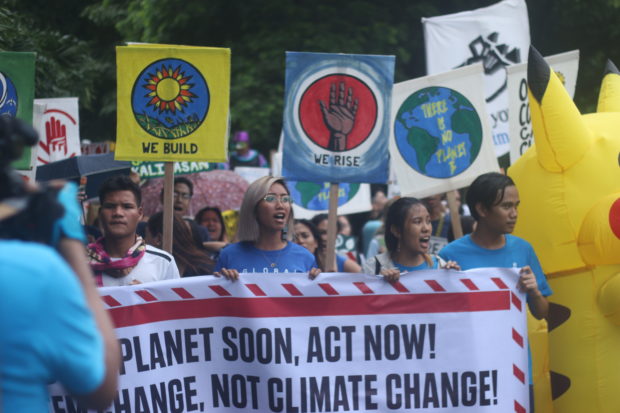
At 23 years old, Mitzi Jonelle Tan feels that leading climate movements and engaging with the youth to act on the climate crisis is her sworn duty. When faced with activist burnout and a gnawing anxiety over a bleak future, the young founder of the Youth Advocates for Climate Action Philippines reminds herself: “I am in the right place.” Photo courtesy of 350 Pilipinas.
MANILA, Philippines — In April 2020, when the number of COVID-19 cases worldwide began to climb, Beatrice Tulagan felt that it was getting too much to bear.
Tulagan, 26, has spent the past seven years lobbying and organizing in the climate movement, where she engages with international and local partners. But with the pandemic closing in on her and the vulnerable communities she works with, doubt began to plague her: What was the point of the work, when the prospects are this bleak?
Across the globe, young people like Tulagan have launched strikes and protests and challenged policymakers and corporations, all to call for action on the climate crisis.
But they find themselves struggling with burnout and increasing anxiety, trauma and grief.
‘What future?’
There was a point last December, said Mitzi Jonelle Tan, that she wept every night, exhausted by organizing assistance to communities devastated by consecutive typhoons.
But what pushed her off the edge was a report that with the current systems, the world is projected to go beyond warming of 1.5 degrees Celsius—the tipping point determined by scientists for Earth’s global temperature increase.
“I sometimes joke with my friends: The future? What future?” said Tan, 23, who cofounded the Youth Advocates for Climate Action Philippines in 2019. “There is always that fear that everything we are fighting for now will not get anywhere, because it’s taking so slow and we need to change so much in such a short time.”
Young and distressed
In recent years, attempts to study the psychosocial impacts of climate change have produced such terms as “eco-anxiety,” “climate distress” and “climate anxiety.”
There are indications that younger people are adversely affected, according to scientists in a comment published in The Lancet last year. This distress may be more pronounced among young climate activists, being in the front lines of advocacy work while contending with an uncertain future.
Much of the studies focus on experiences in the West. There is scarce information on experiences in countries in the Global South, like the Philippines, which are more vulnerable to the adverse impacts of the climate crisis.
“For us, it may not be so much anxiety as climate trauma,” Tulagan said, adding that this trauma is “reawakened” by another strong storm or another prolonged drought.
With the Philippines ranked as the deadliest country for environment activists in Asia, standing up for the environment is also a matter of life and death.
“We’re not just afraid of the banging of the typhoon on our windows, but also the banging of the police on our doors,” Tan said. “There is a very real fear that you could just disappear or get arrested.”
Burden of guilt
Even admitting to burnout and anxiety is a problem for many climate activists. There is hardly time to discuss their personal struggles within their circles, and they feel guilty that the farmers, fishers and indigenous communities they work with are suffering much more than they.
“Even if you want to pause, you find yourself restless because you know that every day, layers upon layers of injustice are left unaddressed,” said Leon Dulce, 32, national coordinator of Kalikasan People’s Network for the Environment.
“But we know that we cannot just abandon the path of struggle that we chose,” he said. “We always say that once we have opened our eyes, we cannot unsee the injustices we already witnessed.”
In the end, the same communities with which they engage become their sources of hope and inspiration to push on.
“How can you lose drive when our unsung heroes in the front lines continue to strive forward?” Dulce said. “I’m not invalidating myself or the experiences of my fellow environmental activists … but it is an exercise of reminding yourself of the boundless possibilities and joys of daring to struggle and daring to win.”
OK to be afraid
With younger people breaking the stigma of mental distress, young climate activists also say it is acceptable to be fearful of the heavy work ahead of them.
“If we are courageous about fighting dictators and corporations, let us also be courageous about showing up for ourselves and being honest with ourselves, where we are and how we are feeling,” Tulagan said.Sustaining a movement, after all, also means sustaining the people who are fighting for the present and the future.
At the peak of her burnout last year, Tulagan took a monthlong break to recharge and reflect. She came back with a stronger drive to do what needs to be done.
Dulce said the struggle for climate and environmental justice is a long haul, and young activists should learn to pace themselves to outlast the systems they are fighting.
Said Tulagan: “We should not think of our work as black and white. Just because a coal plant was built, it does not mean the movement has lost. In the end, the work is about building up communities …. So if you can help organize people to even imagine a better world, I think that is already a win.”